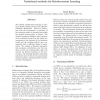Free Online Productivity Tools
i2Speak
i2Symbol
i2OCR
iTex2Img
iWeb2Print
iWeb2Shot
i2Type
iPdf2Split
iPdf2Merge
i2Bopomofo
i2Arabic
i2Style
i2Image
i2PDF
iLatex2Rtf
Sci2ools
106
click to vote
JMLR
2010
2010
Variational methods for Reinforcement Learning
We consider reinforcement learning as solving a Markov decision process with unknown transition distribution. Based on interaction with the environment, an estimate of the transition matrix is obtained from which the optimal decision policy is formed. The classical maximum likelihood point estimate of the transition model does not reflect the uncertainty in the estimate of the transition model and the resulting policies may consequently lack a sufficient degree of exploration. We consider a Bayesian alternative that maintains a distribution over the transition so that the resulting policy takes into account the limited experience of the environment. The resulting algorithm is formally intractable and we discuss two approximate solution methods, Variational Bayes and Expectation Propagation.
Related Content
| Added | 19 May 2011 |
| Updated | 19 May 2011 |
| Type | Journal |
| Year | 2010 |
| Where | JMLR |
| Authors | Thomas Furmston, David Barber |
Comments (0)

